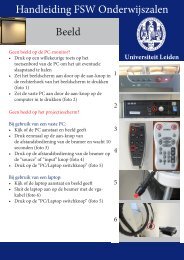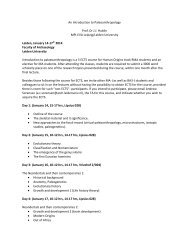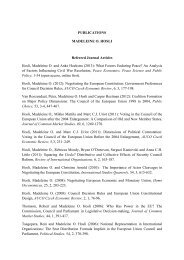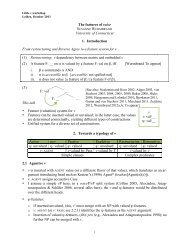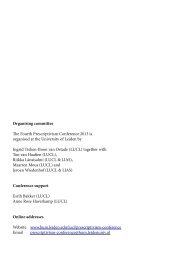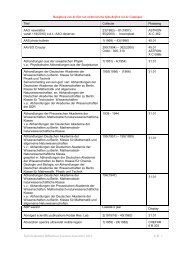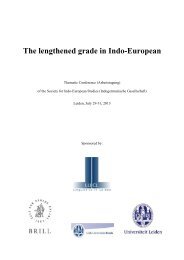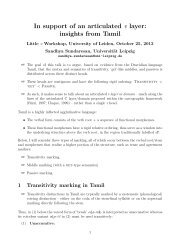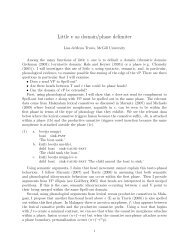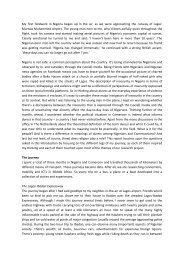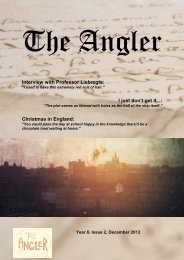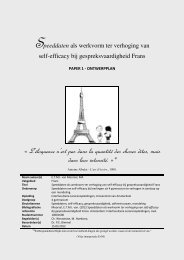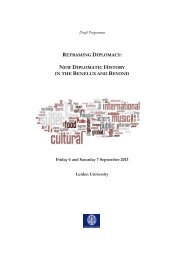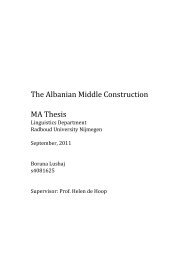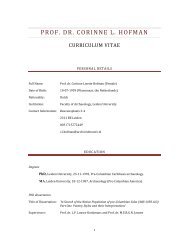Institute for History Annual Report 2010 - O - Universiteit Leiden
Institute for History Annual Report 2010 - O - Universiteit Leiden
Institute for History Annual Report 2010 - O - Universiteit Leiden
Create successful ePaper yourself
Turn your PDF publications into a flip-book with our unique Google optimized e-Paper software.
1992 the Ox<strong>for</strong>d historian Lintott published an<br />
entire book that turns out to be based on an<br />
incorrect arrangement of the surviving pieces of<br />
bronze. Four years later the puzzle was finally<br />
solved by Craw<strong>for</strong>d, the principal discovery being<br />
that the two largest fragments are separated by a<br />
lacuna of no more than ca. 35 characters. The<br />
practical significance of this is that it now seems<br />
possible to arrive at a completely new<br />
interpretation of this crucially important text<br />
which not only summarizes all measures taken<br />
between 133 and 111 BC but also provides a<br />
fascinating overview of the economic functions<br />
and legal status of what remained of the <strong>for</strong>mer<br />
ager publicus in 111 BC. Given the length of this<br />
complicated text, to which Lintott devoted several<br />
years of study, the task of elucidating its contents<br />
is a mini-project of its own.<br />
Romans, Latins and Allies: Demographic<br />
and Military Aspects. (This post-doctoral<br />
project was finalized in 2007).<br />
Any inquiry into the changing size of the Roman<br />
citizenry must pay special attention to the relationship<br />
between Romans, Latins and allies. At<br />
least originally, any Latin who migrated to Roman<br />
territory (mostly the city of Rome) automatically<br />
obtained Roman citizenship. Migrating Latins thus<br />
contributed to the growth of the body of citizens.<br />
On the other hand, between 200 and 170 BC large<br />
numbers of Romans became Latins as they were<br />
sent out to newly founded coloniae Latinae.<br />
Although this two-way exchange of Romans and<br />
Latins is of vital importance <strong>for</strong> our understanding<br />
<strong>Institute</strong> <strong>for</strong> <strong>History</strong><br />
19<br />
of the demographic make-up of 2nd-century BC<br />
Italy, it is a topic to which very few studies have<br />
been devoted. At the same time there is evidence<br />
to suggest that the second century BC was a<br />
period of rapid demographic growth <strong>for</strong> both<br />
Roman and Latins, who seem to have expanded at<br />
the expense of other Italian groups, such as the<br />
Gauls of North Italy. The implications of this<br />
development <strong>for</strong> the vexed issue of how Italy was<br />
romanized (or latinized) have never been explored.<br />
Finally, it would seem that as the second<br />
century proceeded, the Latins and the other Italian<br />
allies had to shoulder an increasing share of the<br />
military burden of imperial expansion. If this shift<br />
was out of line with the patterns of population<br />
growth in various parts of Italy – as would seem to<br />
have been the case – it becomes easier to<br />
understand why the question of Roman<br />
citizenship acquired a prominent place on the<br />
political agenda from the mid-120s BC onwards.<br />
Of course the same hypothesis helps to explain the<br />
outbreak of the Social War (91-88 BC) as a result of<br />
which Roman citizenship was extended to the<br />
entire free population of Central and South Italy.<br />
Moving Romans. Urbanisation, migration<br />
and labour in the Roman Principate<br />
Rens Tacoma<br />
The aim of the Moving Romans project is to study<br />
the relationship between urbanisation, migration<br />
and labour opportunities in Roman Italy in the<br />
first two centuries A.D. The central question is to<br />
what extent labour-induced migration was



